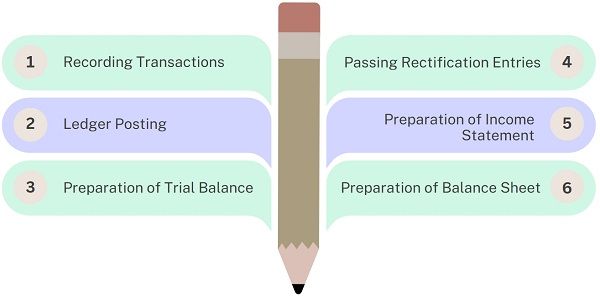 Bookkeeping refers to recording business transactions in a stipulated manner and classifying these transactions with a stipulated set of procedures. On the other hand, Accounting is all about designing a system of records and preparing reports, taking the recorded data as a base. Further, it involves the interpretation and communication of these reports.
Bookkeeping refers to recording business transactions in a stipulated manner and classifying these transactions with a stipulated set of procedures. On the other hand, Accounting is all about designing a system of records and preparing reports, taking the recorded data as a base. Further, it involves the interpretation and communication of these reports.
Bookkeeping does not depict the operating results of a business, whereas accounting indicates the operating results of a business.
Do you know we can accurately analyze business activities only when information about business transactions and events is available?
While bookkeeping is just one part of the accounting process. Accounting is the whole process. We can also say that bookkeeping is the stepping stone of accounting. So, as far as the scope of these two processes is concerned, Accounting is much broader and more analytical than bookkeeping.
Content: Bookkeeping Vs Accounting
Comparison Chart
| Basis for Comparison | Bookkeeping | Accounting |
|---|---|---|
| Meaning | Bookkeeping is recording the company's financial transactions as and when they occur in a systematic manner. | Accounting is the orderly recording and reporting of the financial affairs of an organization for a particular period. |
| Involves | Recording and classification of business transactions. | Recording, classification, summarization, analysis and interpretation of financial data. |
| Stage | It is the first stage in the process of accounting. This is because it forms the basis for accounting. | It is the second and final stage. |
| Nature of task | Routine and clerical tasks. | Analytical task |
| Knowledge required | Knowledge of double entry system and basic accounting. | Knowledge of accounting principles, procedures and practices. |
| Objective | Maintaining a proper record of financial transactions | Ascertaining net results of operations and financial position of the concern and communicating the information to the interested parties. |
| Supervision | A bookkeeper does not supervise and check the work of an accountant. | An accountant checks and supervises the work of a bookkeeper. |
| Period | Bookkeeping gives day-to-day details. | Accounting gives details of an entire year. |
What is Bookkeeping?
The word ‘Bookkeeping’ combines two words, i.e. Book and Keeping. Literally speaking, bookkeeping means keeping, i.e. maintenance, of books. Here, by the term books, we mean Journal and Ledger books. It maintains records of business transactions in such a way that on any subsequent day, one can understand the nature and effect of each transaction and the overall effect of the business activity.
Further, it encompasses recording economic events that result in the transfer of money or money’s worth. Bookkeeping is all about identifying financial transactions and events and then keeping a record of these transactions. The person who performs bookkeeping ensures that documents are present to support all of these transactions. Thereafter classifying these transactions by posting them into respective ledger accounts.
Bookkeeping is an initial and integral part of accounting. It establishes a basis for communicating the financial results of the firm.
Who is a Bookkeeper?
The person who performs the task of bookkeeping is a Bookkeeper. He sets up the company’s books of accounts. Further, he prepares them in a way that ensures systematic recording and classification of business transactions.
Activities Involved in Bookkeeping
Bookkeeping means the systematic recording of financial transactions in the books of accounts. Thereafter, these transactions are posted into the respective ledger accounts. It covers activities like:
- Recording transactions: As and when the transaction occurs, record these transactions in the book of original entries or subsidiary books.
- Posting into ledger account: Classifying transactions and posting the data from different heads to the concerned ledger account.
- Casting the total of ledger accounts: Once the ledger account is prepared, totalling of different ledger accounts occurs.
- Balancing accounts: The process of ensuring that the debit column of the ledger account is equal to the total of the credit column is balancing.
Also Read: Difference Between Accounting and Accountancy
What is Accounting?
Accounting implies the system that identifies, records and maintains economic events and communicates the results thereof. It is related to summarizing the recorded transactions, interpreting them and then communicating their results.
The person who performs the task of accounting is called Accountant.
Accounting is the language of business, as the reports it provides are needed by the concerned parties, such as creditors, employees, investors, shareholders, government agencies, tax authorities, etc. Further, it is also called the language of business.
Activities Involved in Accounting
In accounting, the monetary transactions of an organization are identified and systematically recorded. After that, these transactions are grouped, i.e. the transactions of similar nature are classified into a common group. This step is called ledger posting. This part of accounting comes under bookkeeping. Hence, apart from the activities involved in bookkeeping, it also involves:
- Preparation of Trial Balance: It prepares trial balance from the balance of various ledger accounts.
- Passing Rectification Entries: In case of errors or omissions, passing necessary entries from adjustment and rectification is the next step in the accounting process.
- Preparation of Income Statement: It involves preparing profit and loss account out of the balances shown in the trial balance. It depicts the financial result of the business activity.
- Preparation of Balance Sheet: Once the profit or loss of the firm is ascertained, the next step is the preparation of the Balance Sheet. It will give you a clear picture of the company’s assets, liabilities and capital.
Objectives
- Maintenance of business records systematically.
- Calculation of the company’s profit or loss.
- Presenting the financial position of the company.
- Providing the necessary financial information.
Functions
- Shows a true and fair view of the company’s financial position.
- It helps determine the profit or loss of the business, which is the primary aim of the business.
- Assist in the rational decision-making by users of accounting information.
- Reflects the profitability, performance and earning capacity of the firm.
- Helpful in the calculation of tax liabilities.
- Detects errors and fraud, if any.
Also Read: Difference Between Accounting and Auditing
Key Differences Between Bookkeeping and Accounting
- The process of complete and systematic record keeping of the monetary transactions of an organization by the bookkeeper is bookkeeping. Conversely, the process of recording and reporting of financial transactions related to business is called accounting.
- Bookkeeping stresses the recording of transactions, so the work is clerical in nature. On the other hand, accounting involves summarizing the recorded transactions, which requires a high level of subject knowledge, expertise, analytical skills and conceptual understanding.
- Bookkeeping is the primary stage of accounting. By virtue of that, bookkeeping is the basis for accounting. Conversely, Accounting is the second stage, which starts when the bookkeeping ends.
- Accountants direct and review the work of bookkeepers. Further, it checks the arithmetical accuracy of the ledger accounts which a bookkeeper prepares.
- Bookkeeping does not need any analytical skills. It is based on the principle of a double-entry system. Conversely, accounting requires analytical skills so as to interpret the results shown by the financial statements.
- Bookkeeping aims at systematic maintenance of the economic events of the company in the books of accounts. As against, the objective of accounting is to ascertain the financial performance of the company and assess the financial position of the company.
- Bookkeeping creates a base for accounting so that the financial statements can be prepared as per the recorded information. In contrast, Accounting involves the preparation of financial statements as per the data available through the bookkeeping process.
- Bookkeeping work requires basic knowledge of accounting. Hence, it can be performed by junior staff. On the contrary, accounting work requires expertise and knowledge in that particular field. Therefore, the task of accounting is performed by senior staff.
- Bookkeeping work is not based on accounting work. But, accounting work is based on the completion of bookkeeping.
- There is a double-entry system of bookkeeping that guides a bookkeeper’s work. As against, the accountant has to follow the relevant accounting standards and principles.
Video: Bookkeeping Vs Accounting
Conclusion
Above all, we could say that bookkeeping and accounting are complementary and supplementary to each other. While bookkeeping is a mechanical and repetitive activity, at the same time, it is an integral part of accounting.







Panashe Dinha says
Nice everything is briefly described
Ema Styles says
Thanks so much. It’s very helpful. Easy and short.
Shane Maxwell says
Thank you.
Medvisor consultant says
Hi,
Thanks for sharing a fantastic information about the bookkeeping and accounting ,I read this kind of information and remember the best point of this post which help me to run a business successful after reading a post .
Thanks
Surbhi S says
To all the readers,
We are really glad to know that you find the article helpful. Thanks for your appreciation, keep reading and sharing,
Morris Edwards says
This is one aspect where people are often confused. Thanks for sharing a fantastic information about this.
Syed K siraj says
Very useful information for a basic learner,
explanations is very simple and understanding to everyone…
Accounting and bookeeping services says
Nice information
Dee Nur says
Well illustrated, the information speaks volumes. Thanks for the input.
Ashish Sahu says
Now i clearly know the difference between bookkeeping and accounting. Really good article. well done, keep it up!
Nelson says
nice